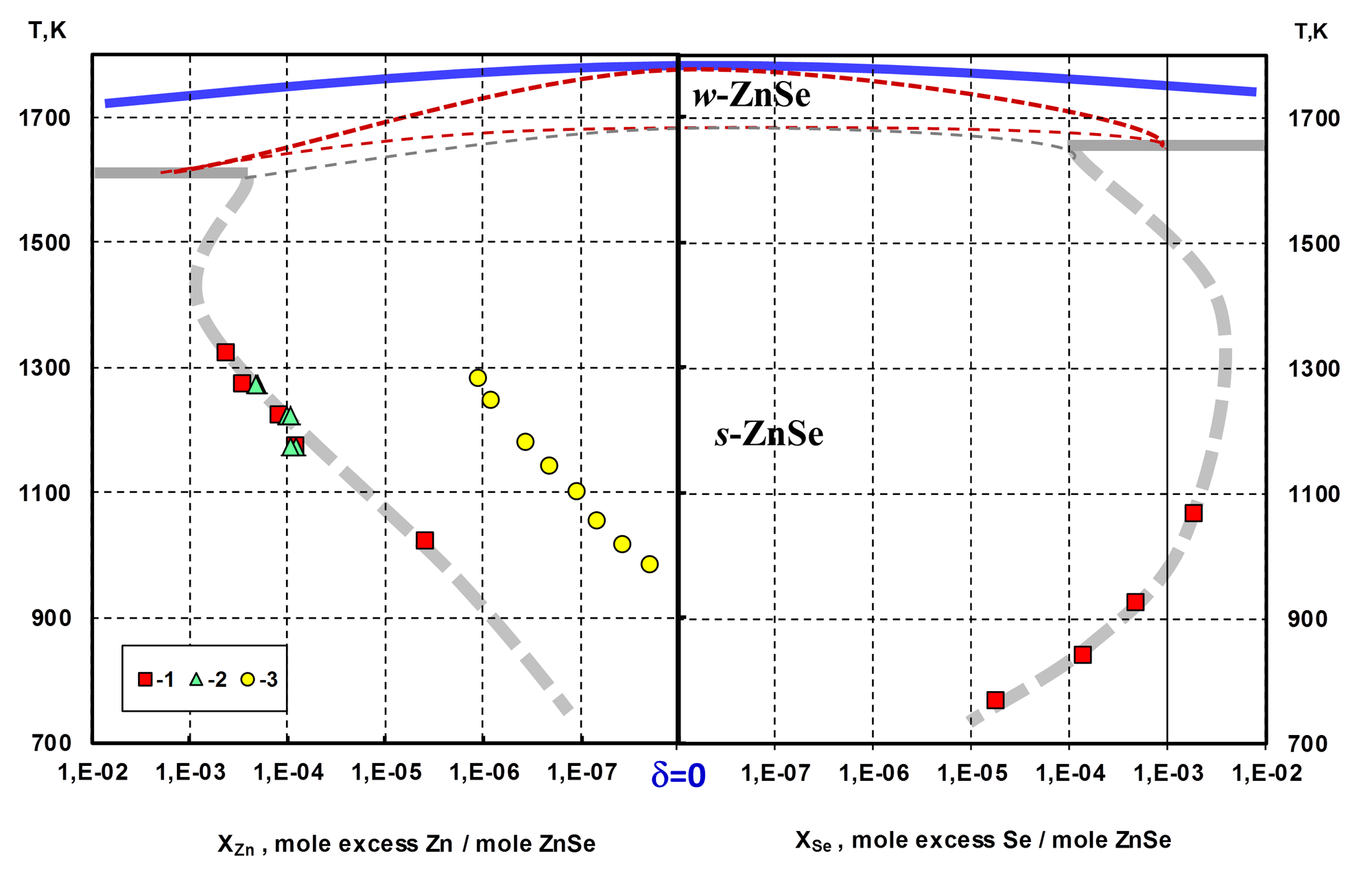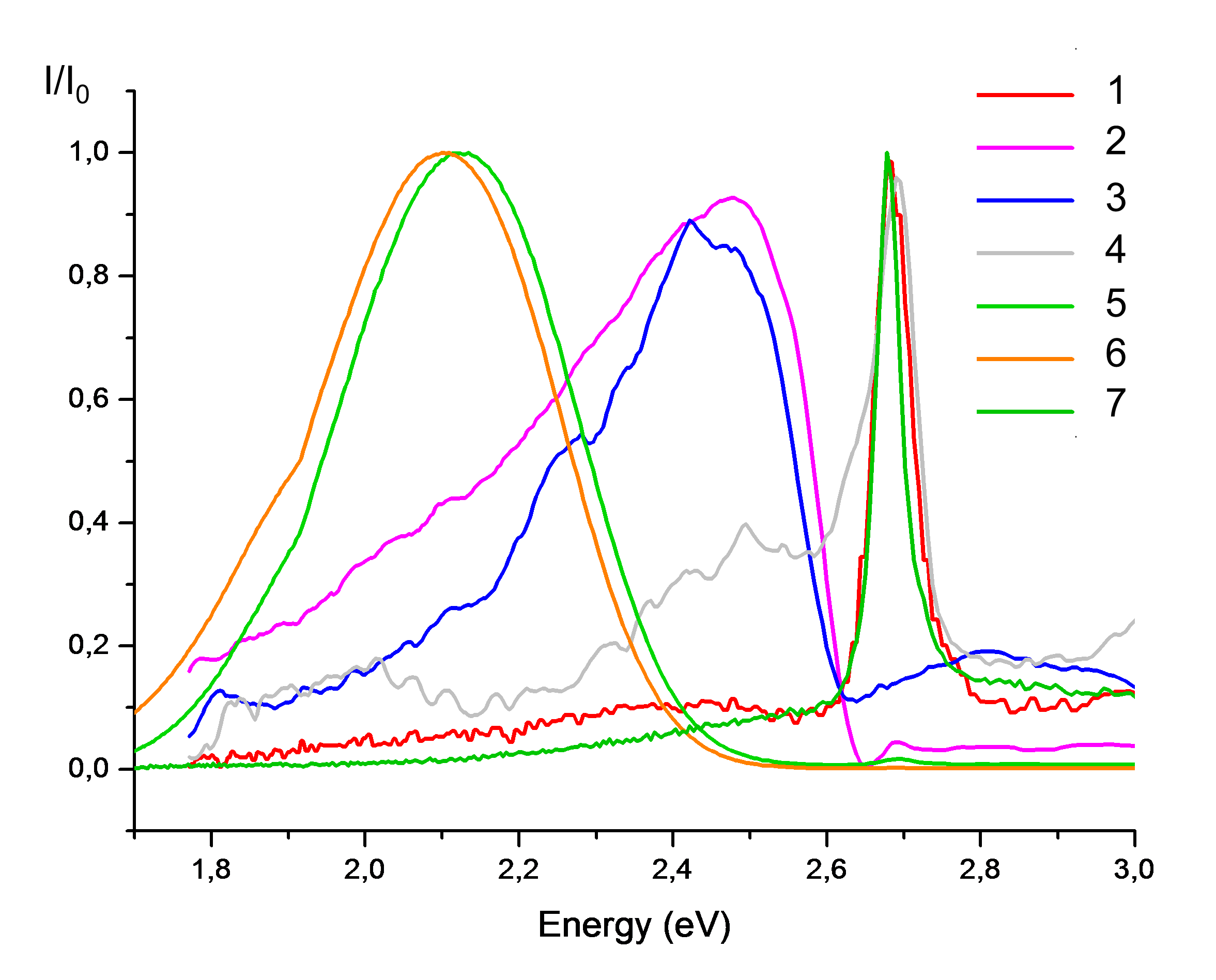| Search for content and authors |
Nonstoichiometry and optical properties of ZnSe crystal grown from melt and vapor |
| Igor C. Avetissov 1, Khan Chan 1, Nikolai V. Zhavoronkov 2, Albert A. Davydov 2, Elena Mozhevitina 1, Andrew Khomykov 1, Svetlana P. Kobeleva 3, Sergei Neustroev 2 |
|
1. D.I.Mendeleyev University of Chemical Technology of Russia (MUCTR), Miusskaya sq. 9, Moscow 125047, Russian Federation |
| Abstract |
ZnSe single crystals are of great interest as perspective materials for X-ray detectors and VIS-IR transparent windows for lasers. But till now there is no sufficient data on ZnSe homogeneity region, especially with the emphasis on wurtzite - sphalerite (3C-2H) polymorphous transformation close to the melting point. The proposed scheme of this transformation was performed in [1] based on DTA experiments. In the present research we studied ZnSe homogeneity region by direct physical-chemical method [2] in the temperature range 765-1320 K (Fig.1). It was found out that homogeneity region of undoped ZnSe included stoichiometric composition and retrograde behavior of solidus lines both from Zn- and Se-rich sides was observed. Comparison of Zn nonstoichiometry with the of ionized defect concentrations at Ss-ZnSe-L(Zn) equilibrium let us say that at the above conditions the dominant point defects are electrically neutral.  Fig.1. Homogeneity region of ZnSe with the proposed scheme of 3C-2H polymorphous transformation [1]: 1, 2- our data, 3 – calculated from free carrier concentrations [3]. In the research we studied the crystal properties produced by vapor and melt growth techniques. The vapor growth was conducted by Markov-Davydov method [4]. The crystals did not touch in contact with growth reactor walls and was grown on a sapphire substrate. As-grown crystals were 100 mm diameter and 20-25 mm height. Other crystals were grown from the melt by directional solidification under high (100 atm) static pressure. The melt growth was conducted from graphite and glass carbon crucibles. As a source materials we used CVD-ZnSe [5] and muli-resublimation process (4 steps) in dynamic vacuum. Due to ICP-MS analysis melt grown crystals in carbon glass crucible and vapor grown crystals were as pure as source materials. In case of a graphite crucible we observed a decrease of crystals purity. Nonstoichiometry of all materials was examined. For the crystals the correlations between growth conditions, nonstoichiometry, luminescent properties (Fig.2) were found out. 
Fig.2. PL spectra of ZnSe preparations at 300 K ( λext=370 nm): 1-resublimated polycrystal, 2- CVD-ZnSe N1 after synthesis, 3- CVD-ZnSe N2 after synthesis, 4- CVD-ZnSe N2 (after extraction of an excess component), 5-melt grown crystals at high pressure in graphite crucible, 6- melt grown crystals at high pressure in glass-carbon crucible, 7- vapor grown crystal. In case of vapor grown crystal (7) and resublimated ZnSe polycrystal we observed exciton peak 2.68 eV with FWHM 0.04 eV and 0.06 eV, correspondingly. Melt grown crystals demonstrated 2.10 eV (6) and 2.13 eV (5) luminescence with FWHM 0.35 eV, which could be attributed with Se nonstoichiometric defects in ZnSe crystals. Synthesized CVD-ZnSe preparations were characterized by complex spectra but the main peaks were 2.48 eV (3 ) and 2.69 eV (2). According to nonstoichiometry determination these peaks were attributed with excess Zn in CVD-ZnSe preparations. The research was supported by Ministry of Education and Science of Russia by grant N 16.513.11.3144 1. Okada H., Kawanaka T. J. Cryst. Growth. 165 (1996) 31-36. |
| Legal notice |
|
| Related papers |
Presentation: Poster at 17th International Conference on Crystal Growth and Epitaxy - ICCGE-17, Topical Session 4, by Igor C. AvetissovSee On-line Journal of 17th International Conference on Crystal Growth and Epitaxy - ICCGE-17 Submitted: 2013-03-14 19:30 Revised: 2013-03-28 14:19 |